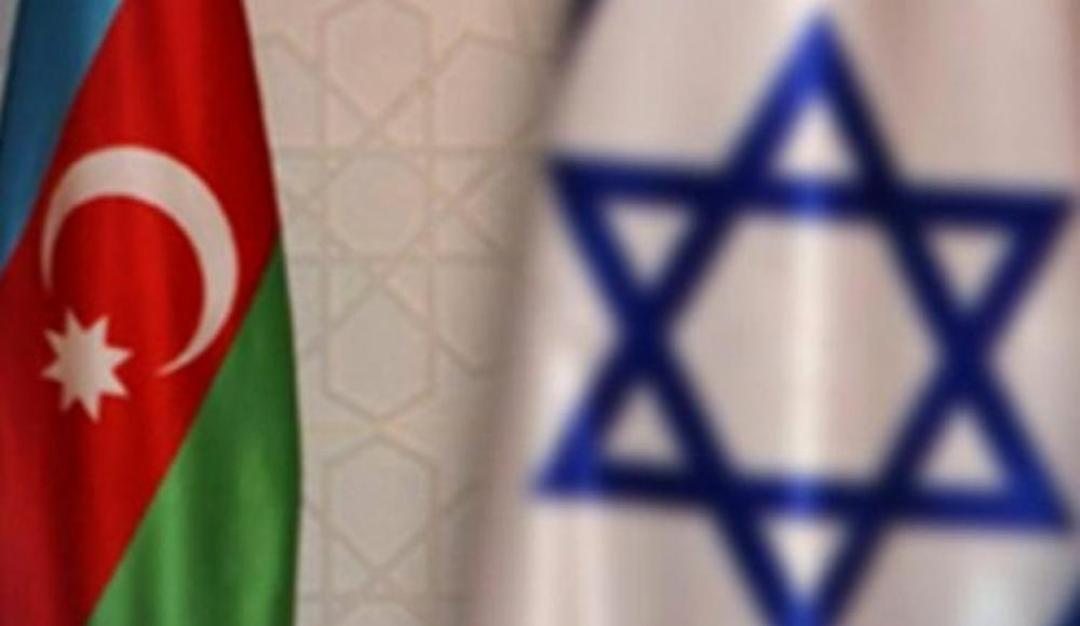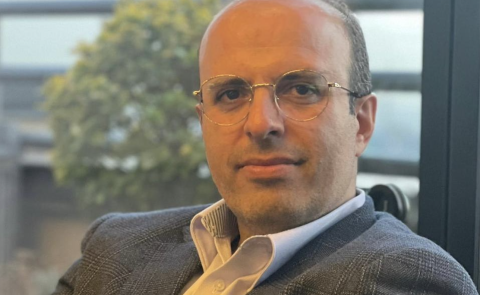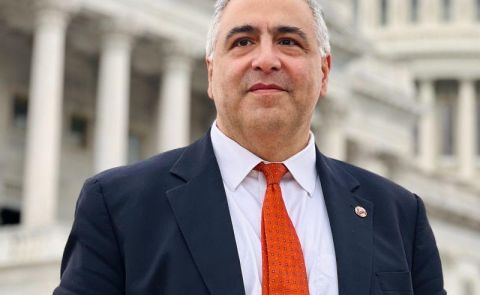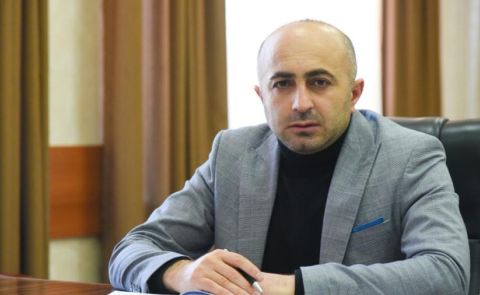
Evolvement of the Azerbaijan-Israel Relationship: Interview with an Expert

In an exclusive interview with Caucasus Watch, Aynur Bashirova describes the historical development and the current state of the relationship between Israel and Azerbaijan. Aynur Bashirova has completed her bachelor’s at Vesalius College in International Affairs, her master’s at University of Kent in Brussels in International Law, and an advanced masters’ at the Institute for European Studies (IES) of the VUB in European Integration. She has been a visiting fellow at the Rubin Centre in Herzliya, Israel, in 2017, where she published a comprehensive article on the issue together with Professor Ahmet Sozen, which can be accessed here. Currently, she is still continuing her research on Israel’s bilateral relations with Azerbaijan and her general areas of research include Israel, the South Caucasus, the Middle East, foreign policy, and defense.
Can you give our readership a short summary of how the partnership between Azerbaijan and Israel came into being and how it developed over the decades?
First of all, the relationship between Azerbaijanis and Jews predate the creation of their respective states. There are several Jewish communities in Azerbaijan, the biggest ones being the Caucasus Jews and Ashkenazi. There was never anti-Semitism in Azerbaijan. Indeed, one of the Zionist movements, Hovevei Zion (Lovers of Zion) was established in Baku in 1891, the prominent Rothschild family established the first oil company, Caspian Black Sea Company, in 1883 and had an enormous contribution to laying the foundations and development of the energy industry in the country, and during the First Republic of Azerbaijan (1918-1920), Jews were appointment to several ministerial positions, to name only a few examples.
These events had a big role to play in the establishment of the partnership between Israel and Azerbaijan in the early 1990s. Azerbaijani expatriates in Israel talked well about their host country and for Israel the past relationship was an important catalyst to see Azerbaijan as a trustworthy partner.
In 1991, Israel was one of the first countries to recognize the independence of Azerbaijan. In 1993, Israel opened an embassy in Baku. However, the foundations of the current partnership were put in place in 1997, during Prime Minister Benjamin Netanyahu’s visit to Azerbaijan, where he met with then President of the new country, Heyder Aliyev. In this meeting, Netanyahu emphasized the importance of policy coordination in two areas, energy and security, which became the cornerstone of Israel-Azerbaijan relations. Since 2012, the relationship started getting deeper and more known; more agreements were reached, SOCAR (public energy company of Azerbaijan) acquired a 5% share in Med Ashdod and this is the first experience of SOCAR outside of Caspian Basin. Since 2016 until now, Israel-Azerbaijan relations became more known to public as media became more eager to publish the developments and interviews.
Israel-Azerbaijan relationship came into existence and continued to develop due to several factors. The lack of anti-Semitism in Azerbaijan is only the first factor. Many Jews are respected members and contributors of Azerbaijani society. Azerbaijani Jews residing in Israel are also active in informing Israeli public about the Jewish life in Azerbaijan, most notably AZIZ (Diaspora Organization of Azerbaijani Jews in Israel) headed by Lev Spivak, Arye Gut (an active blogger and commentator), Yosef Shagal (Israeli journalist and former Knesset [Parliament of Israel] member), Alex Wexler (now retired Israeli politician) to name only few.
Secondly, Israel and Azerbaijan have a similar outlook on the regional geostrategy. They both have similar fears from radical forces active in the region, both have a garrison state (surrounded by enemies) feeling, and want to secure a safe development for their countries. Besides, I would say that both can be considered to be a lone country; that is to say that they cannot completely fit into Eastern or Western cultural or political life and do not have many friends.
Thirdly, Azerbaijan is rich in hydrocarbons and its trade is a big part of Azerbaijani economy, while Israel until recently did not have energy resources. Hence, Azerbaijan is covering most of Israel’s petrol need.
Forth, Israel has a negative reputation in many Muslim majority countries, due to its conflict with the Palestinians. Even if this conflict is ethnic and territorial rather than religious, many people see it as a Jewish-Muslim confrontation. Good relations with Azerbaijan are a way for Israel to show that it is ready to establish relations with Muslim majority countries and Jewish-Muslim coexistence is possible. Through in case of Azerbaijan it is easier because the state follows a secular policy. Baku also does not establish its foreign policy relations based on religion or culture of other countries, but based on other aspects, such as geostrategic, economic, and political interests as well as history of past interactions.
Like you just mentioned, - and described in your article in detail - Anti-Semitism is not a structural problem in Azerbaijan and the country has been historically a safe-haven for Jews. How can that be explained?
In Azerbaijan there is generally a culture of respect toward other ethnicities and religions. Jews are not an exception to this. I think it comes from a culture of historically being traders and hosting several belief systems throughout history.
A symbol of this open culture is the Red Settlement, in Quba, Azerbaijan. It was created in the 18th Century by a local ruler, Feteli Khan. He called for Jews living in other areas to establish a settlement under his protection and declared that any attack on Jews living under his safeguard would be considered as a direct attack against him. Many Ashkenazi Jews came to Azerbaijan during the 19th and 20th century pogroms in Eastern Europe because Azerbaijan was considered as a safe haven.
Throughout, Jews are held in high regard due to their role in the economic development of Azerbaijan in the early 20th century and later help of Israel to Azerbaijan to recover from post-Soviet stress in the 1990s.
Could you imagine a future growth in anti-Semitism in Azerbaijan?
It is difficult for me to imagine it. If there would have been growth of anti-Semitism, it would have emerged by now. I cannot see any changes in that respect. Practically, everyone I know is friendly toward Jews. Many Azerbaijanis I know, when hearing about my area of research, Israel-Azerbaijan relations, talk well about Jews and show an interest in learning more about Israel.
Considering how negative Jerusalem’s relations with the Islamic nations in the Middle East are, how is the partnership with Azerbaijan perceived by Israelis?
Many Israelis are not well aware of Israel-Azerbaijan relations, which is also the case in Azerbaijan. It is a new country and others still have to come to know it, and there is a steady progress on that aspect. This relationship has also recently started seeing media attention and people need time to catch up. Throughout my experience, I have not seen anything negative toward Azerbaijan neither in Israel nor among Jews residing elsewhere. I frequently attend Jewish events in Belgium, where I live, and always feel very welcome and some know about Azerbaijan and others lack information. Some like Azerbaijan and have visited or would like to visit Azerbaijan and others are neutral, but there is no negativity, just warmness or indifference.
What are the most important areas for strategic cooperation? In your article you mentioned energy and military cooperation, can you elaborate on that?
Energy, military and security are the main areas of strategic cooperation.
Considering energy, Azerbaijan provides most of Israel’s need in petrol through the Baku Tbilisi Ceyhan (BTC) pipeline, which gets transported to Israel through tankers from the port Ceyhan in Turkey. This situation also allowed Israel and Turkey to retain a working level relationship after the diplomatic dispute following the Gaza Flotilla incident. Energy security for Israel is a national security issue. Due to its location, it needs to find a reliable energy provider, which is also located not too far away. Israel has an unsteady relationship with its neighbors, most of which are abundant in hydrocarbons. Until the fall of the Soviet Union, reliable sources were also located geographically distant; hence it was expensive to transport them from such places, like the North Sea region and South America. In 1999, the first gas field in Israel was discovered near Ashkelon, followed by other discoveries, the biggest one so far being the Leviathan gas field found by Noble Energy in 2010. However, many of these fields are disputed due to their locations falling at borders and it takes time to estimate the amount of hydrocarbons these fields have and start drilling operations.
When it comes to the military cooperation, the military sector comprises most of the trade between the countries. Additionally, Israel has been involved in the modernization of Azerbaijan’s military and training of security and intelligence services. There is also a joint venture between the Ministry of Defense of Azerbaijan and Aeronautics Defense Systems of Israel for the common manufacturing of weapons.
You can get more detailed information about energy and military cooperation from the article, where we elaborate on them in more detail.
The Israeli newspaper Yediot Aharonot stated that Israeli Defense Minister Avigdor Lieberman’s visit to Baku could have been actually aimed at meeting with Turkish representatives on neutral ground. What role could Azerbaijan play in the Turkish-Israeli relationship?
Azerbaijan has very good relations with both Israel and Turkey and wants these two countries’ disputes to be resolved. Indeed both Avigdor Lieberman and Recep Tayyip Erdogan were in Azerbaijan at the same time recently. Whether Azerbaijan played a role in it or not is not possible to say, since both the minister and the president often conduct state visits to Azerbaijan.
Having good and trustful relations with both Israel and Turkey, Azerbaijan could play a role of a mediator. Azerbaijan might or might not want to play the role of a mediator, but there should be willingness on part of Israel and Turkey to negotiate. Azerbaijan might also not participate in the negotiations, but act as a neutral host country. However, regardless of the Turkey-Israel relations, they are both important partners for Azerbaijan and Baku would continue its cooperation with both of them. Its relations with either Turkey or Israel are not affected by the level of dispute between them.
At the moment, there are not only tensions between Turkey and Israel but also between Russia and Israel. How much influence do you think Moscow and Ankara, two of Baku’s biggest partners; have on the relationship between Azerbaijan and Israel?
Israel is a very important partner for Azerbaijan. So far, neither Moscow nor Ankara managed to pressure Baku into reducing its relationship with Israel. So far, Moscow and Ankara also have not tried to strongly pressure Baku. Israel-Azerbaijan relations survived many tensions in the region. Yet, at the same time, Azerbaijan is a member of the Organization for Islamic Cooperation (OIC) and expects to have Muslim majority countries’ votes at the United Nations; this is also to a certain extend a pressure on Baku concerning its relations with Israel. However, it should be noted that Azerbaijan’s foreign policy direction is following the route of trying to have good relations with all the countries and so far, Baku has been successful in staying away from conflicts, with the exception of Armenia, due to the territorial conflict over Nagorno-Karabakh and the seven surrounding regions. Besides that, Baku’s relations with Israel or any other country are not directed against third parties. Azerbaijan is not aspiring to get involved in international conflicts or have a saying power over other countries, but is rather attempting to secure a safe and peaceful existence for itself.
It seems like Azerbaijan has conflicting interests with its Iranian neighbor but generally retains a working relationship with Teheran, to the contrary of Israel. How much is the relationship between Azerbaijan and Iran affected by this rather close strategic partnership?
Indeed, the main external pressure regarding this relationship comes from Tehran and this is one of the main reasons why Azerbaijan does not have an embassy in Israel. Iran does have suspicions about Israel-Azerbaijan relations. Israel and Azerbaijan often conduct projects together and have frequent bilateral state visits and Tehran watches it all from across the border. However, Baku and Tehran also have working level relations and common projects. Israel-Azerbaijan relations, as I mentioned previously, are not directed against third parties. Iran also has good relations with Armenia, with which Azerbaijan does not have diplomatic relations. These issues do create tensions between Tehran and Baku from time to time, but does not affect the overall level of association between the neighbors.
You mentioned in your article, that the strategic alliance between both countries partly originated because Israel wanted a way out of its isolation. The relations between Jerusalem and its Arab neighbors seem to get better due to the common enemy Iran. Could Azerbaijan become less important in the future if Israel is able to realign with mayor Arab powers?
I do not believe that Azerbaijan will become less important. Isolation was only one of the reasons why Israel approached Baku. Azerbaijan and Israel have already established joint cooperation in many spheres. Besides that, Israel-Azerbaijan relations are not something supported only by the government elites in Azerbaijan; the wider public also has warm feelings towards Jews and Israel, which is not the case for many other countries in the Middle East. Apart from Azerbaijan, Israel also has good relations with Kazakhstan, which is a neighbor of Azerbaijan. Additionally, Israel-Azerbaijan relations have potential for further development. Relations could grow, get stronger and more enlarged, which cannot be said with certainty about Israel’s association with Arab powers at this stage. I do not believe that the same level of trust and cooperation reached between Israel and Azerbaijan can be achieved between Israel and Arab powers. Israel-Azerbaijan relations do not exist due to a common enemy, but due to a common general outlook. This in international relations is an indication of a stronger relationship and a shared viewpoint toward the future, rather than cooperation based on an imminent threat. Besides that, Tehran and Baku have a relationship as well; they are not conflicting parties, it’s just that Azerbaijan is closer to Israel than to Iran and this situation has not changed since Israel and Azerbaijan created their diplomatic relations.
Israel-Azerbaijan relations, I believe, will continue as they were, regardless of Israel’s connections with Arab powers. On the contrary, it might even enhance them and give a different dimension to the relations. Azerbaijan, being a country that has relations with both Arab powers as well as Israel and which is also a member of OIC, Baku could even play the role of a mediator or a host country for state meetings and negotiations, like it is the possibility in the Turkish-Israeli case. Azerbaijan is a neutral country when talking about most of the international disputes and conflicts, so it always has the potential to play this kind of role.
Interviewer: Philip Roehrs-Weist
Siehe auch


Ali Mousavi Khalkhali: Iran wird Konflikte im Kaukasus vermeiden

Aram Suren Hamparyan: Lasst uns nicht mit weniger Land und weniger Frieden dastehen

Hayk Khanumyan kritisiert die armenische Regierung für ihren Umgang mit Karabach-Flüchtlingen und ihre Außenpolitik

László Andor: Ungarns Transaktionen im Südkaukasus

